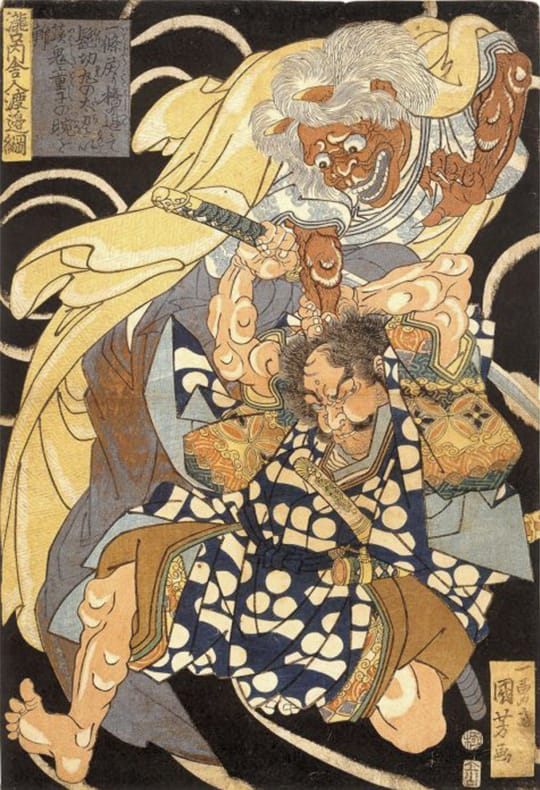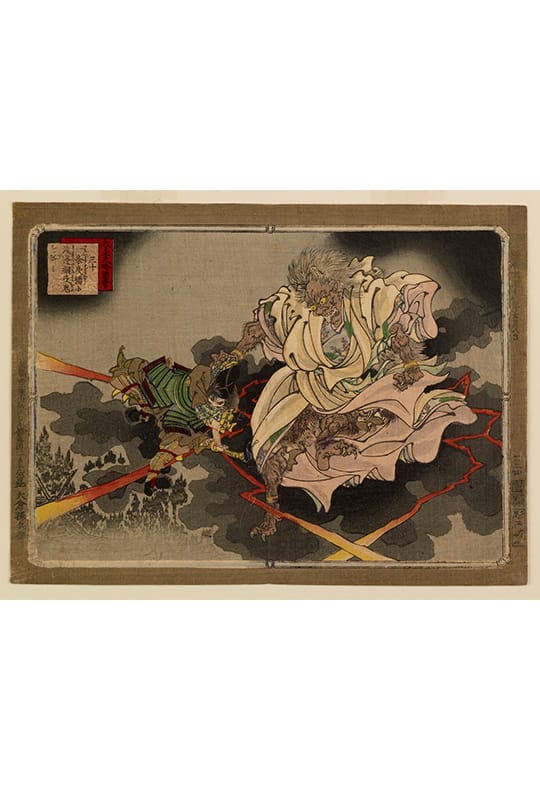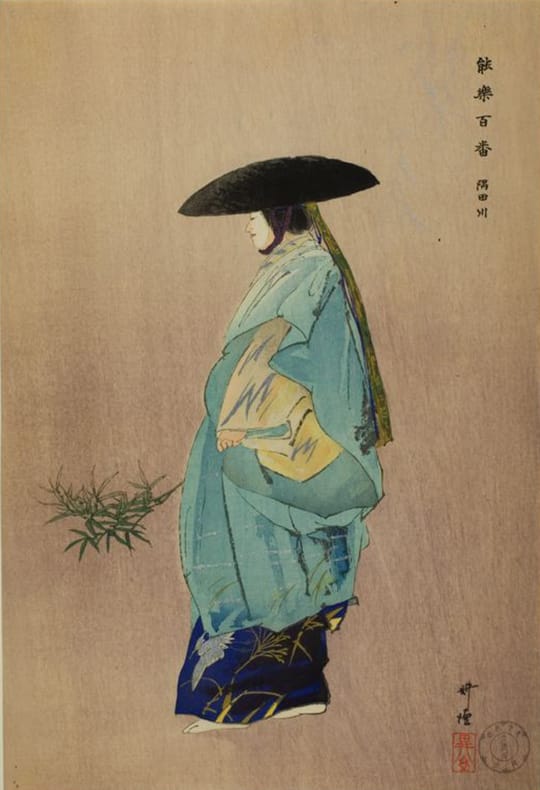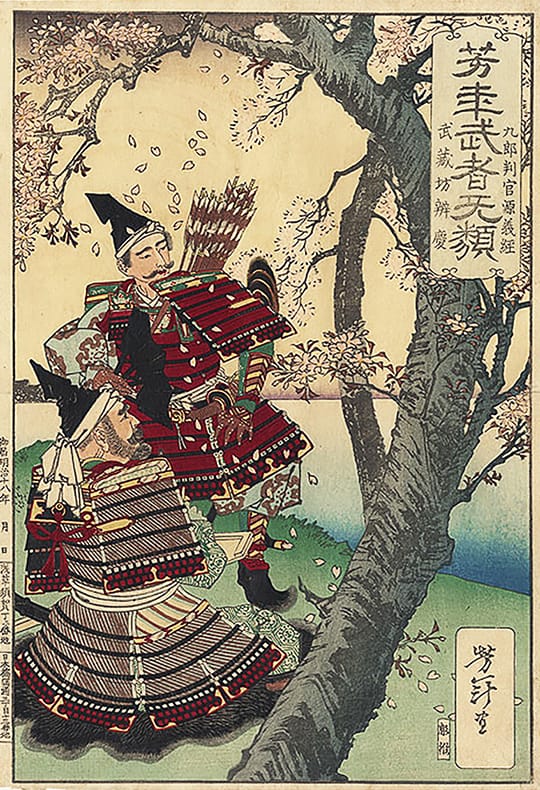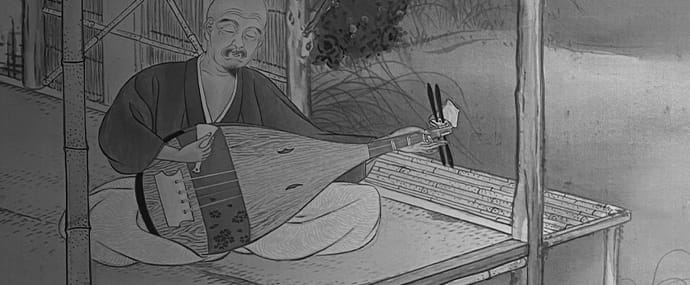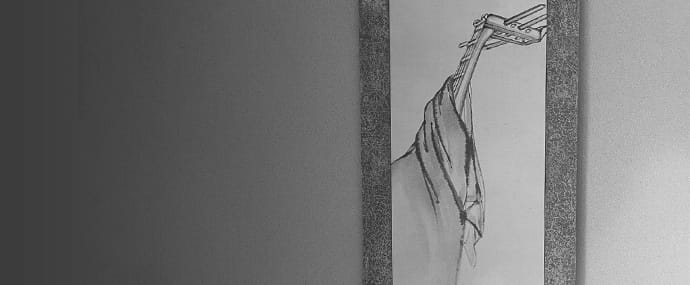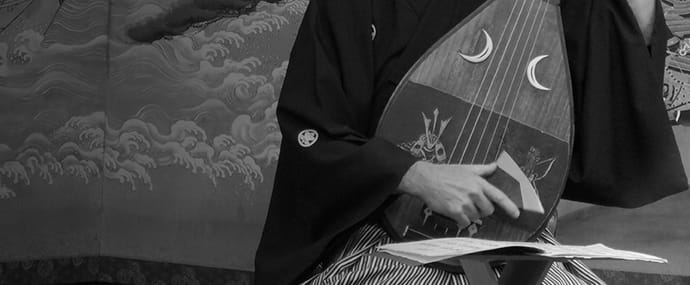
adachigahara
安達ケ原
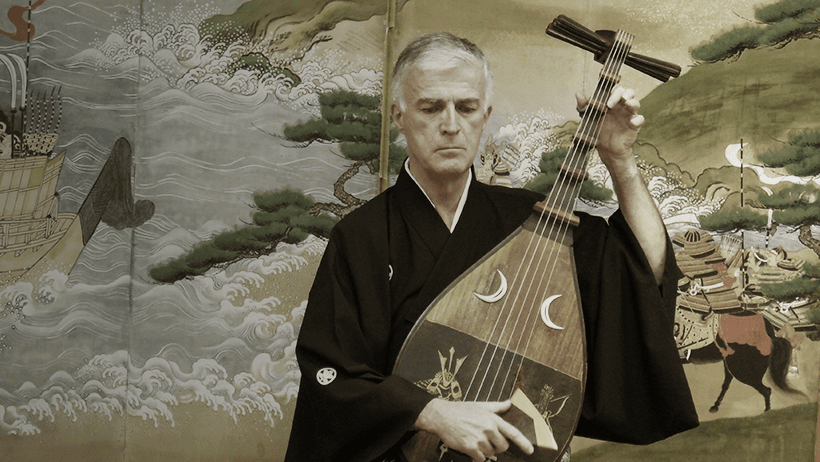
Introduction
The legend of a demon living in the region of Adachigahara in Michinoku (present day Nihonmatsu city in Fukushima pref.) dates to the Heian period (794-1185). There are poems referring to this legend in both the Shūiwakashū, a poetry collection of the year 1006, and in the Tales of Yamato (Yamato monogatari) written around 951. Based on these sources, the Noh play, Kurozuka, was written in the Muromachi period (1336-1573). The KANZE school of Noh performance refers to this play as Adachigahara, this play then serving as the basis for the Edo-period jōruri piece (1762), Ōshū Adachigahara, and once again for KIMURA Tomiko’s 1939 Kabuki dance piece, entitled Kurozuka.
Using many of the earlier lines, the biwa text relies heavily on the Noh text. The composer, YAMAZAKI Kyokusui, however, also turned to numerous other sources, and it may be possible to describe the text as more of a pastiche. She therefore denied authorship, stating that the writer was “anonymous”.
Synopsis
In late autumn, Yūkei, a priest from Wakayama, sets out on a pilgrimage to Michinoku (present day Fukushima prefecture, Tōhoku). Unfamiliar with the region, he loses his way one evening, and begins to desperately look for a place to stay. As the sun is setting, he spots a hut in the distance. He travels to the hut, and when he knocks on the door to beg for lodging, the voice of an old lady welcomes him, and apologizes for the wretchedness of what she can offer. She returns to her spinning wheel where she bemoans her miserable life, and longs for the brighter past to return. When night falls, she remarks about the cold and tells the priest that she will go to the mountains to collect wood for a fire. As she leaves, she admonishes the priest not to enter a room in the back of the hut while she is away. Alone, the priest wonders why such an elderly woman would go to the woods so late at night. He becomes suspicious and very curious about the room he was forbidden to enter. No longer able to resist, he finally opens the forbidden door to be greeted by the gruesome sight of corpses and human bones stacked to the ceiling. Yūkei is terrified, and as he begins to flee, the old woman returns in her true form, a demon. He realizes that he had come to the notorious “Black Hill” (Kurozuka) in the Adachigahara fields. Brandishing an iron staff, the demon attacks. Yūkei invokes the Five Kings of Light and defends himself. The demon, deploring her fate, finally disappears in dark clouds to a clap of thunder.
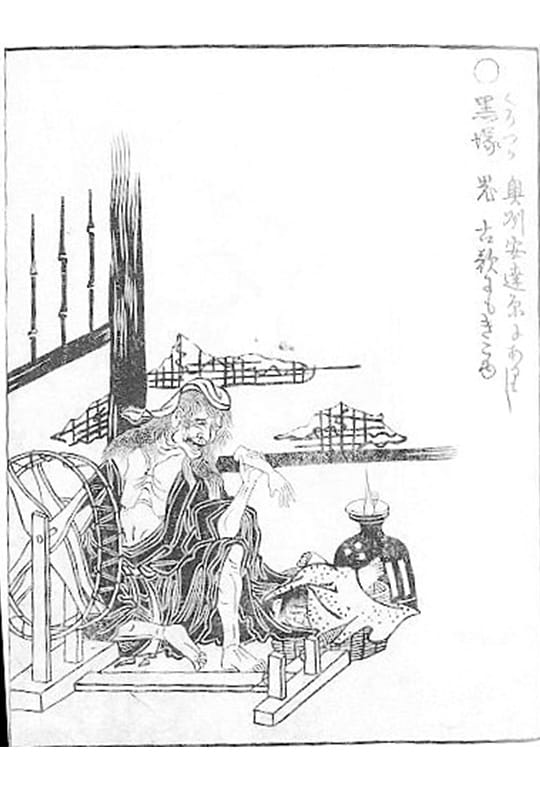
Lyrics
-
1. The linen robe of the wandering monk In grob gewobnem Reisekleid
Tabi no koromo wa suzukake no 旅の衣は篠懸の
-
2. the linen robe of the wandering monk, in grob gewobnem Reisekleid
tabi no koromo wa suzukake no 旅の衣は篠懸の
-
3. its sleeves heavy with dew. mit taugetränkten Ärmeln
tsuyukeki sode ya shioruran 露けき袖やしおるらん
-
4. An eminent priest from Nachi, sehen wir hier Priester Yūkei aus Nachi
koko ni Nachi no ajari こゝに那智の阿闍梨
-
5. Yūkei, a resident in the Tōkō quarters. vom Tempelviertel Tōkō.
Tōkōbō no Yūkei wa 東光坊の祐慶は
-
6. his heart filled with vows, Tief erfüllt von frommem Sehnen
kokoro ni tatsuru gannarite 心に立つる願ありて
-
7. was on a pilgrimage through the country, wandert er durch viele Länder,
shokoku angya ni omomukan to 諸国行脚に赴かんと
-
8. his route taking him to the Kii peninsula, auf dem Pfad von Kii
wakeyuku sue wa Kinojigata 分け行く末は紀の路方
-
9. and past Shiozaki Bay. entlang der Shiozaki Bucht.
Shiozaki no ura sashisugite 潮崎の浦さしすぎて
-
10. The days passed and he soon Yūkei war schon viele Tage auf der Pilgerreise,
hi mo kasanareba hodo mo naku 日も重なれば程もなく
-
11. arrived in Michinoku, als er in die Gegend von Michinoku,
na ni nomi kikoeshi Michinoku no 名にのみ聞こへし陸奥の
-
12. Adachigahara, a place he only knew by name. nach Adachigahara kam – ein Ort, der ihm vom Namen her bekannt war.
Adachigahara ni tsukinikeri 安達が原に着きにけり
-
13. It was late autumn, Ende Herbst war es geworden,
toki shimo aki no suetsukata 時しも秋の末つ方
-
14. a time when the gloom of evening arrives unexpectedly early. wenn am Abend allzu früh die Sonne untergeht.
hi mo haya itsuka kurehatenu 日も早やいつか暮れはてぬ
-
15. Just when he was at a loss, Yūkei war besorgt um eine Bleibe, als er unversehens
kōji hatetaru orishimo are 困じ果てたる折しもあれ
-
16. he saw the light of a distant fire. in der Ferne Licht erblickte.
kanata ni miyuru hi no hikari 彼方に見ゆる火の光
-
17. Filled with joy, Yūkei struggled along and finally arrived. Freudig ging er in die Richtung (bis er bald vor einer Hütte stand).
Yūkei yorokobi tadoritsuki 祐慶喜びたどり着き
-
18. “Please, I am an itinerant priest and have lost my way, „Ich bin ein Wanderpriester, der ein Dach sucht überm Kopf.
ko wa yomichi ni mayoishi tabisō ni sōrō こは夜路に迷いし旅僧に候
-
19. take pity and grant me one night’s lodging, Habt Mitleid, lasst mich eine Nacht hier unterkommen“,
aware ichiya no yadori wo ba あわれ一夜の宿りをば
-
20. I beg of you!“ he pleaded. bat er flehend.
yurushi tamae to koikereba 許し給へと乞ひければ
-
21. From within the hut a voice was heard, Aus dem Innern hört‘ er eine Stimme:
iori no uchi yori koe arite 庵りの中より声ありて
-
22. “In these fields, far from the houses of men, „Fern von jeder Menschen-Siedlung, weit im Felde draußen
hitozato tōki kono nobe no 人里遠きこの野辺の
-
23. I live in this hut so miserably rude, lebe ich in kümmerlicher Armut.
ware dani mo uki are’io ni 我れだにも憂き荒庵に
-
24. How could I possibly have you stay? Wie soll ich denn Euch empfangen…?
ikade ka otome mōsarubeki いかでかお留め申さるべき
-
25. Yet I am pained at the thought of turning you away. Allerdings Euch nicht hier aufzunehmen, schmerzt mich auch,
towa iu monono omoeba oitawashiya とは云ふものゝ思へばお痛しや
-
26. So be it, you are welcome to stay.” so seid denn halt mein Gast.“
saraba ontome mōsan to さらば御留め申さんと
-
27. The door opens, and beckoning Yūkei Ganz langsam ging die Türe auf,
to o aketezo shōjikeru 戸を開けてぞ招じける
-
28. is an old, humble woman. ein altes Weib trat auf die Schwelle.
toshioitaru shizugame no 年老いたる賤が女の
-
29. In the depths of the night, compassion spins In der Nacht umgarnt das Mitgefühl die Seele
nasake mo fukaki yo mo sugara 情けも深き夜もすがら
-
30. as do the threads in this room where mit den Fäden auf der Spule in der Spinnerstube,
ito kuru neya no maai yori 糸くる閨のまあいより
-
31. the misty moon glimmers. wenn der Mond verhangen blass ins Zimmer scheint.
tsuki mo oboro ni sashiirite 月もおぼろにさし入りて
-
32. “The Spinning Wheel turning with the Six Paths, “Ach wär‘ das Spinnrad doch das Rad mit den ‚Sechs Pfaden‘,
Rokudōrinne no itoguruma 六道輪廻のいと車
-
33. If only the past could return,” dass es mir die alten Zeiten wieder brächte“,
mukashi o ima ni nasabaya to 昔を今になさばやと
-
34. she sighed in her grief. lamentierte sie erbarmungswürdig.
nageku sama koso aware nare 嘆く様こそ哀れなれ
-
35. When night had deepened, Als die Stunde vorgerückt war,
itsushika yoru mo fukeyukite いつしか夜も更けゆきて
-
36. and the chill of the blowing wind sinks into the flesh, hub ein kalter Wind zu blasen an, und seine Kälte schnitt ins Fleisch.
fuku kaze itodo mi ni zo shimu 吹く風いとゞ身にぞ泌む
-
37. at this moment, the old woman turned and said, Da sprach die Alte:
sono toki rōba no mōsu yō 其の時老婆の申すよう
-
38. “Well, my honored priest, „Mein verehrter Gast,
ikani kyakusō dono いかに客僧どの
-
39. as the night has become so very cold, es ist gar kalt in dieser Nacht,
amari yozamu ni gozarimasureba あまりに夜寒にござりますれば
-
40. I shall go to the mountains and collect wood da muss ich jetzt im Wald
yama ni noborite ki o torite 山に登りて木を取りて
-
41. to build an open fire. doch Brennholz holen gehen;
takibi o shite shinzemashō hodo ni 焚火をして進ぜませう程に
-
42. Please wait for a while.” wartet hier ein Weilchen.“
shibaraku onmachi kudasare to しばらく御待ち下されと
-
43. Just as she was about to leave, Beim Verlassen, schärfte sie ihm ein:
ideyukan to suru kiwa ni 出で行かんとする際に
-
44. “But, honored priest, until my return, „Oh, ehrenwerter Mönch,
moshi onsōsama warawa no kaeri kitaru made 若し御僧様妾の帰り来る迄
-
45. under no circumstances are you to look into Ihr dürft auf keinen Fall, versprecht es mir,
kono neya no uchi o ba この閨のうちをば
-
46. this chamber here.” in jenes Zimmer schauen!”
kanarazu goranze kudasaruna to 必ず御覧ぜ下さるなと
-
47. And with these parting words, she left. Und mit diesen Worten brach sie auf.
kotoba o nokoshite tachiizuru 言葉を残して立ち出る
-
48. “But how strange! „Ist das nicht sonderbar,
satemo fushigi ya na さても不思議やな
-
49. for a woman, in the middle of the night dass eine Frau zu dieser späten Stunde noch
nyonin no mi nite kono yofuke 女人の身にて此の夜更け
-
50. to go alone into the mountains.” alleine in die Berge geht?“
hitori de yama ni irishi to wa to 一人で山に入りしとはと
-
51. Yūkei, with doubts in his heart, Dem Priester Yūkei war es nicht geheuer.
fushin no kokoro ni Yūkei wa 不審の心に祐慶は
-
52. despite his vow to not look, Hatte er ihr zwar versprochen, das Verbot zu achten,
mimaji to chikaishi kotonagara 見まじと誓いし事乍ら
-
53. stole a fleeting glimpse of her forbidden room, and when he did, wagt‘ er dennoch einen Blick in das geheime Zimmer.
rōba no heya o ukagaeba 老婆の部屋をうかゞへば
-
54. “What could these horrific things be! Ah – wie grauslich,
ara osoroshiya ko wa ika ni あな恐ろしやこわ如何に
-
55. Severed limbs and white bones nur Skelette, Beine, Schädelknochen
shikotsu hakkotsu michimichite 死骨白骨満ち満ちて
-
56. piled to the eaves, bis zur Decke aufgeschichtet,
noki to hitoshiku tsumiokare 軒と等しく積みおかれ
-
57. the stench of decay thick in the air. ein Gestank, ganz fürchterlich.
atari ni shishū tadayoite あたりに死臭たゞよいて
-
58. It was truly a terrible sight. Gar scheußlich war das, unbeschreiblich.
geni suzamajiki arisama nari げに凄まじき有様なり
-
59. Without a doubt, this was the rumored Dies ist also der verruchte
korezo masashiku oto ni kiku これぞまさしく音に聞く
-
60. “Black Hills” of Adachigahara „Schwarze Hügel“ von Adachigahara,
Adachigahara no Kurozuka ni 安達ヶ原の黒塚に
-
61. where a demon has secluded itself to live. wo ein Dämon wohnt!
komoreru oni no sumika nare 籠れる鬼の住家なれ
-
62. At a loss, his nerve vanished, Dem Priester Yūkei sank der Mut, er zitterte.
kokoro mo madoi kimo o keshi 心もまどひ肝を消し
-
63. he trusted only his legs, but as he fled So schnell ihn seine Füße trugen, wollte er entfliehen.
ashi ni makasete nigeyukeba 足にまかせて逃げゆけば
-
64. “Here! Priestly guest! „Heh, mein Gast,
ikani kyakusō いかに客僧
-
65. Stop!” bleibt stehn!
tomare to koso 止まれとこそ
-
66. Into this most secret of chambers, Ihr habt in diese Kammer, die für Euch verboten war,
sashimo kakuseshi neya no uchi さしもかくせし閨の内
-
67. You have looked, a most hateful thing to have done!” geguckt – wie niederträchtig seid Ihr doch!“
nozoki mitaruka urameshiya to のぞき見たるか恨めしやと
-
68. The fury in her angry voice was terrifying. beschimpfte sie ihn brüllend.
ikareru koe no suzamajiku 怒れる声のすざまじく
-
69. Lightening thundering around her, Blitze flammten,
inazuma atari ni todorokeba 稲妻辺りに轟けば
-
70. the sky darkened with clouds blown in the wind. Wolken fegten, Winde stürmten,
sora kakikumori kaze fukite 空かき曇り風吹きて
-
71. The demon, thinking to devour the priest in one bite, und mit ihrem Riesenrachen schnappt‘ sie nach dem Mönch,
oni hitokuchi ni kuwan to te 鬼一口に食わんとて
-
72. raised her iron staff and attacked. und schwenkte wie von Sinnen ihren Eisenprügel.
tetsujō furiage osoikereba 鉄杖振りあげ襲いければ
-
73. In desperation, Yūkei raised his voice in prayer, Yūkei hob die Stimme:
Yūkei hisshi no koe hariage 祐慶必死の声はり上げ
-
74. “Great Guardian God of the East „Großer Wächtergott im Osten
tōbō ni Shōsanze Myōō 東方に障三世明王
-
75. and Priest Kundali Yaksha to the South”, und im Süden Kundali Yaksha steht mir bei!“
nanpō Gundari Yasha to 南方軍荼利夜叉と
-
76. furiously rubbed his rosary, and to the sound of their rattling, verzweifelt rieb er seinen Rosenkranz
juzu sarasara to oshimonde 珠数さらさらと押しもんで
-
77. he invoked Itoku of the Five Kings of Light, und flehte Itoku, einen der Fünf Himmelsfürsten an,
Godaimyōō no itoku ni kake 五大明王の威徳にかけ
-
78. and continued his ceaseless attack with his humble prayers. denn nur Gebete waren seine Waffen.
semetsuke semetsuke inori fuseba 責め付け責め付け祈り伏せば
-
79. The hag, crazed with rage, Aber diese taten ihre Wirkung, denn das wilde Hexenweib
sashimo funnu ni kuruitaru さしも憤怒に狂いたる
-
80. suddenly weakened. erlahmte mit der Zeit.
kijo mo tachimachi yowari hate 鬼女も忽ち弱り果て
-
81. “What shame to be seen like this!” „Ach, was für eine Schande ist doch meine Existenz“,
ana hazukashi no wa ga sugata to あな恥かしの我が姿と
-
82. The agony in her wails ever so horrible, beklagte sie ihr Schicksal, um gleich wieder aufzuschreien
iu koe nao mo suzamajiku いふ声なをも凄まじく
-
83. faded into the howl of the night storm, in dem Lärm der Sturmesnacht,
yoarashi no oto ni tachimagire 夜嵐の音に立ちまぎれ
-
84. as she finally vanished. in der sie bald verschwand,
sugata wa tsuini usenikeri 姿は終いに失せにけり
Notes
1.-3. The first 3 lines are a quotation from the Noh-play, Kurozuka; they are identical with the first three lines of the Noh play Ataka. 4. Nachi… is located on the Kii Peninsula (Wakayama pref., Higashi Murogun Nachi Katsuurachō), but here, it actually refers to the Nachi Shrine, one of the three famous Kumano shrines. 9. Shiozaki Bay…This inlet is in Wakayama pref., in Higashimurogun Kushimotochō. 11. Michinoku… the present-day prefectures (in Northern Japan) of Fukushima, Miyagi, Iwate and Aomori. 12. Adachigahara… This region belongs to Nihonmatsu City in Fukushima pref. 32. The Wheel of the Six Paths…This Buddhist term refers to The Wheel of Six Realms (or Worlds) of Existence. These Six Worlds are: 1.The World of Gods, 2.The World of Fighting Demons, 3. The World of Humans, 4. The World of Animals, 5.The World of Hungry Ghosts, 6.The World of Hell. 74. Great Guardian God of the East… is in Japanese, Shōsanze Myōō (Trailokyavijaya). He removes the three psychological vices of humanity – ugly greed, anger, and the stupidity of saying what is not worthy of saying – in the past, the present and the future. 75. Kundari Yaksha… He is the Great Guardian God of the South, who protects people from enemies from the otherworld such as martial gods and demons. The snakes around his arms symbolize his determination to achieve his mission. The Eastern Guardian God (line 74) and this Southern Guardian God are important deities invoked in prayers of the mountain ascetics, oryamabushi. 77. Five King of Lights…in Japanese: Godai Myōō Itoku are the two above mentioned Guardian Gods of the East and the South. The three others are the following: the God of the West is Daiitoku Myōō (Itoku) mentioned in this line, the God of the North is Kongō Yasha, and the God of the Centre is Fudō Myōō. The latter is the most important deity for yamabushi.
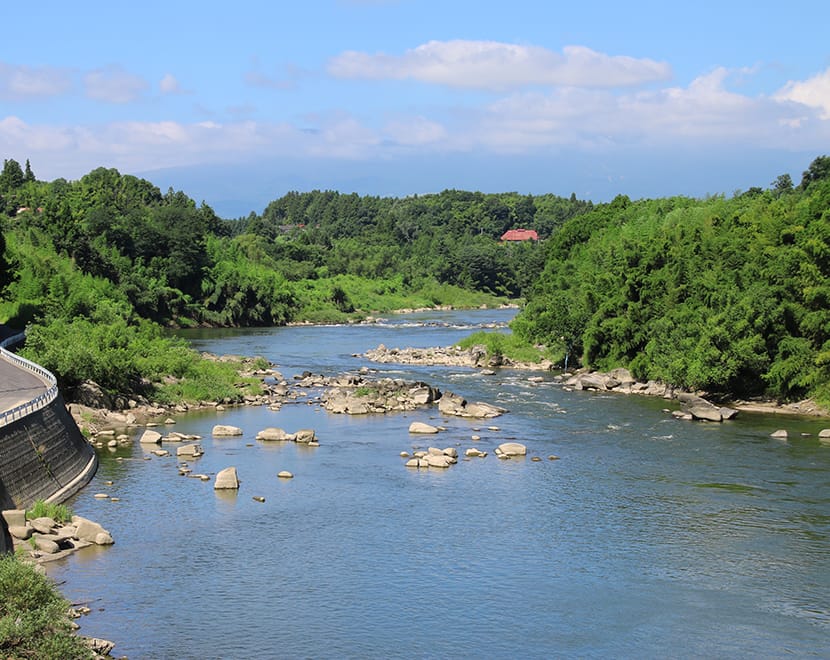
Music Notes
OKUMURA Kyokusui, a former student of the composer, commissioned YAMAZAKI Kyokusui for this work in 1998. Several aspects of the piece thus exploit the talents and tastes of this extraordinary performer, who is now also a Living National Treasure.
Before OKUMURA Kyokusui entered the biwa world, she was an accomplished koto player and a kouta singer, a chamber music vocal genre associated with the teahouse culture of the Edo period (1603-1867). The piece draws upon a variety of vocal styles, and opens, for example, with two lines to be delivered in the style of utai, or Noh chant as the biwa imitates the kotsuzumi, a shoulder drum associated with Noh.
From line 18, the dialogue between the monk and the old woman must be delivered as serifū, a form of heightened speech. The most demanding part for the average biwa performer is line 29 through 36 as the substance of this arioso passage clearly cites kouta, a very different vocal form when compared to the melodic profile of the standard chikuzen biwa style.
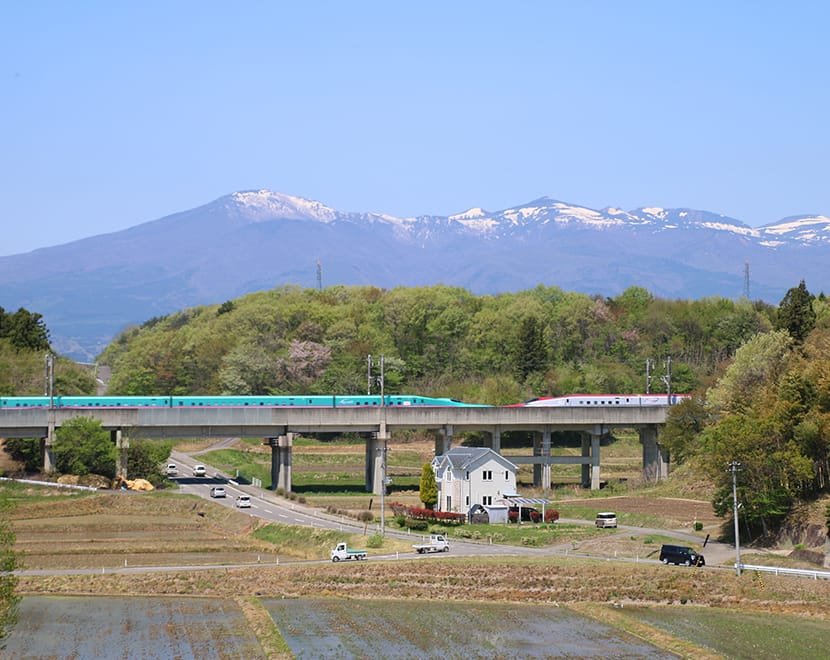
OKUMURA Kyokusui became famous for her delivery of lines 38 through 42 in which the old woman pretends to leave for the woods. While the woman still appears to be a fragile aged lady, the listener is nonetheless gradually aware that she is actually an ogre.
The climax is, of course, the moment when the monk opens the door to the chamber filled with bones and mutilated corpses. When he tries to flee, YAMAZAKI created a unique and startling instrumental technique to highlight the tension of this terrifying scene (line 63). The performer places the left hand on the melodic string below the fifth fret, and slides (one octave) upwards while playing intensively. If well performed, these achingly high sounds unquestionably enhance the suspense of this scene.
The piece ends with a beautiful imitation of shōmyō, or Buddhist chant, which contributes one more vocal style to this colorful telling of a ghost story.
